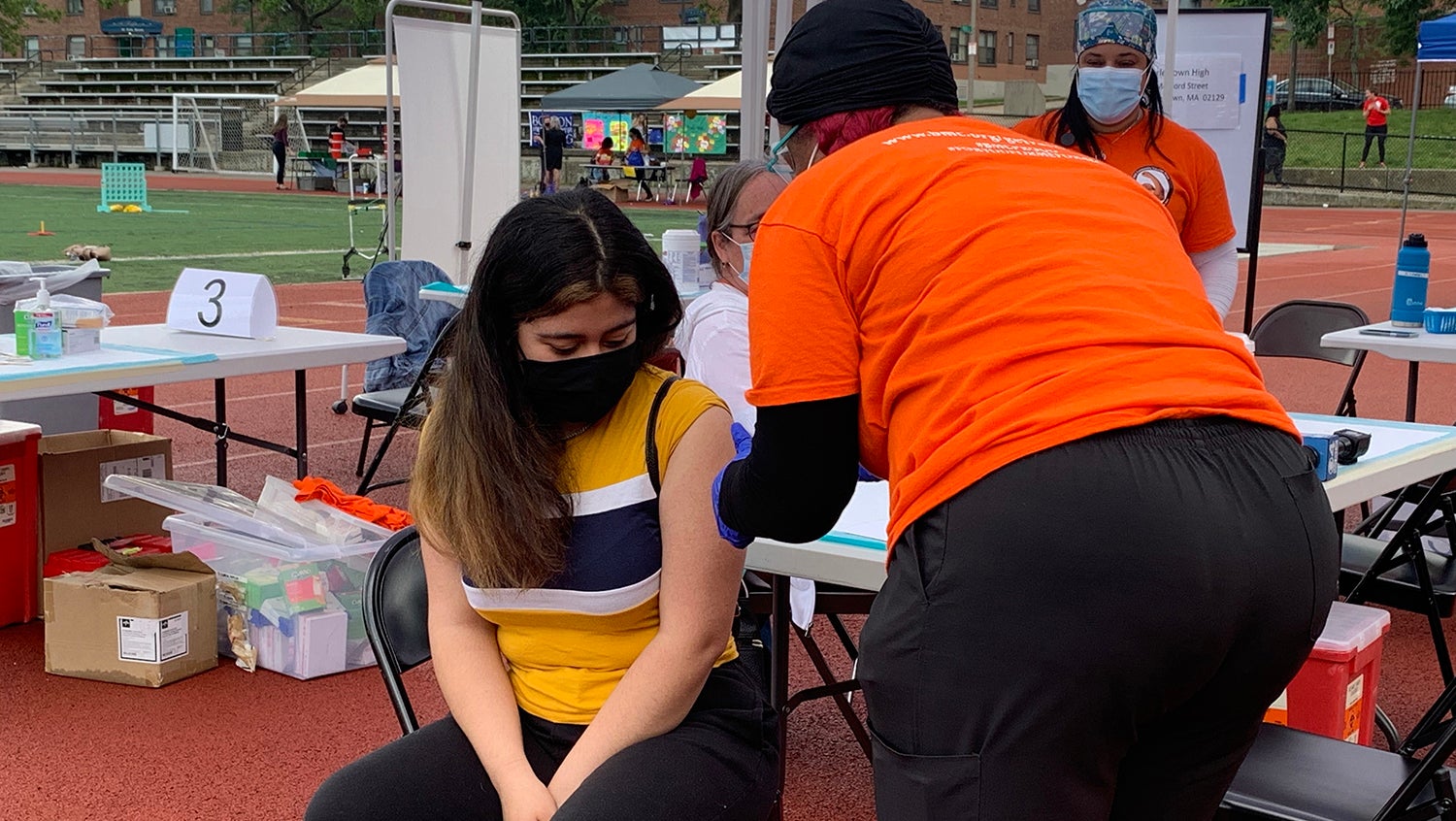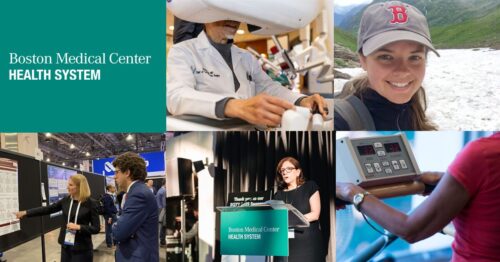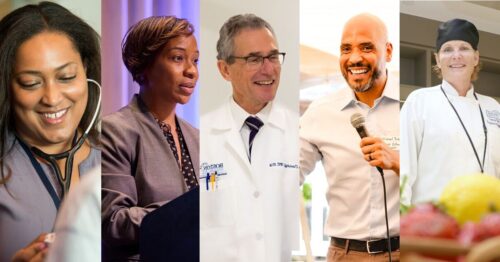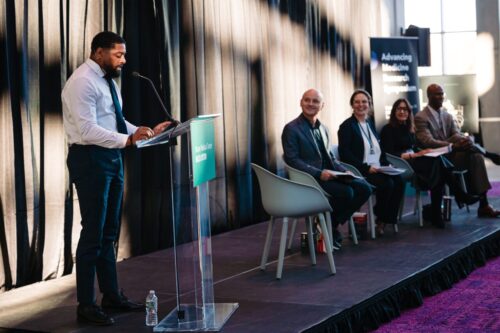Partnering With Boston Schools Is a Key Part of Youth Vaccination Effort
December 9, 2021
By Meryl Bailey

Jazmin Holdway for Boston Medical Center
Staffed by a multilingual, multicultural team of nurses and pediatric residents, BMC's pop-up clinics meet youth where they live, learn, and play.
Back in May, when the Food and Drug Administration approved the Pfizer-BioNTech COVID-19 vaccine for emergency use in adolescents aged 12 to 15, the vaccination strategy team at Boston Medical Center was ready to mobilize—quite literally.
A multilingual and multicultural team of nurses and first-year pediatric residents are traveling in medical vans stocked with vaccines and meeting youth where they learn and play. Their efforts are opening access to health education and immunizations for Boston neighborhoods that were hardest hit by the coronavirus. These mobile clinics have been welcomed into schools, after-school programs, faith-based organizations, and other community sites across Boston.
In total, more than 215 vaccination events have taken place at over 90 community sites. Developing a strong partnership with Boston Public Schools (BPS) has been critical to the hospital’s youth vaccination effort, says Alicia Peterson, MBA, BMC’s director of operations for COVID-19 vaccines, who is also principal investigator for the $1 million Health Resources and Services Administration grant that helps fund the mobile vaccine clinics.
The school-based vaccination effort began as a word-of-mouth campaign at individual schools. Then, this summer, with the start of a new school year approaching, Peterson says school district leadership reached out to formalize the partnership.
“We said, ‘Look, here’s what BMC can offer. We want to make this easy as possible for you. We’re a one-stop shop. We’ll bring our setup, our vaccines, and staff. All we need is for you to connect us with the school leaders,'” she says.
By partnering with BPS, BMC has hosted more than 115 school-based COVID-19 vaccine pop-ups at more than 60 district, charter, and vocational schools, many in neighborhoods with the highest COVID-19 case rates, including Charles Sumner Elementary School in Roslindale, Boston Arts Academy in Dorchester, and Fenway High School in Roxbury.
Vaccinating youth is integral to stopping the spread of COVID-19 within schools, enabling students to return to consistent in-person learning programs that are uninterrupted by outbreaks. Involving school staff and school nurses has made it possible for more of the community to have access to the pop-up vaccine clinics, opening it up to staff, parents, and local community residents.
Health equity is at the center of mobile COVID-19 vaccination rollout
The multipronged immunization effort extends beyond schools. BMC is closely partnering with the Boston Public Health Commission, the Vaccine Equity Now! Coalition, and immigrant-focused organizations to ensure that the clinics are readily available to people of color and the most socially vulnerable populations. The team’s outreach targets demographics who were most impacted by the surges of coronavirus in the spring and fall of 2020.
For example, BMC has opened pop-up vaccination clinics at churches and faith centers, such as Iglesia de Dios in Jamaica Plain and Church of God in Dorchester, as well as community sites, including Score4More Basketball in Roxbury, Harambee Park in Mattapan and Dorchester, and even a block party in Hyde Park.
With the mRNA vaccines, such as those from Pfizer-BioNTech and Moderna, come many questions—especially from concerned parents making decisions for their children.
Peterson stressed that culturally competent care is a core component of the effort.
“We’ve intentionally formed our vaccination team, ensuring it is representative of the communities we serve. Sixty-five percent of our teams speak two or more languages, and 85% of our team are people of color, including all on-site leadership. Patients have expressed how comfortable they feel asking questions, because it’s someone who looks like them, who speaks their language and understands,” she explains.
“Our team speaks over eight different languages. When we think about access, there’s not always going be a Spanish speaker at Walgreens, and there’s not always going to be a Haitian-Creole speaker at CVS. That’s a barrier for many people.”
Since the unit began traveling into communities in May 2021, the team has administered over 2,800 first doses of COVID-19 vaccines—half of those to youth under 19 years old. The majority of people receiving their first dose are Black and Latinx.
Ask-a-Doc health education
With the mRNA vaccines, such as those from Pfizer-BioNTech and Moderna, come many questions—especially from concerned parents making decisions for their children.
For that reason, Ask-a-Doc booths are part of the mobile vaccine clinics. Staffed by first-year pediatric residents in the Boston Combined Residency Program at BMC and Boston Children’s Hospital (BCH), they provide on-site experts to answer questions ranging from the science behind mRNA vaccines to common side effects of COVID-19 vaccination.
Jeffrey Edwards, MD, a first-year resident in the combined residency program, who leads the Ask-a-Doc staff, says these pop-up events take a step toward rebuilding trust between health professionals and community members. Because the medical system has a long history of mistreating communities of color, repairing that relationship matters for BMC, where more than half of patients are people of color.
“We recognize that there exist significant barriers to accessing health services, especially for folks from limited-resource settings. By going to events in the community, we hope that people heard the message that we are here for them, both in and out of the hospital,” he says.

<em>Pediatric residents from the Boston Combined Residency Program are ready to answer questions about COVID-19 vaccines. (Jazmin Holdway for Boston Medical Center)</em>
Colleen Kelly, MD, a chief resident in Pediatrics at BMC, who is involved in the effort to staff the Ask-a-Doc booths, says that adding new medical technology and youth to the decision-making process can be particularly stressful for caregivers.
“It’s not just convincing the person who’s getting the vaccine but also the parent. That makes this population different than targeting adults. Some parents say, ‘I’ll do it for myself,’ because they feel okay about the new vaccine for themselves but are concerned about giving it to their child, wondering what the impact might be,” Kelly explains.
“Then, there is the question of: If it is not mandatory for school, do I need this? Is this in the best interest of my child? Should we get it later? These questions about timeline or temporality come up a lot.”
Kelly is impressed by how the pediatric residents have come together to spearhead the initiative’s health education component with support from BMC faculty, from pulling together educational resources to hand out at the booths to creating a trendy branding for the campaign meant to appeal to youth. Forty residents are expected to cycle through the mobile vaccine unit this year.
“A lot of these residents have just moved to Boston and don’t know the city that well but have thrown themselves into this and are using it as an opportunity to really explore where their patients are from or where they live now,” she says.
Strategies to vaccinate elementary-age students
Now that the Pfizer-BioNTech vaccine has been approved for elementary school-aged children, the BMC vaccine strategy team is building on collaborations to provide specific access to this age group. School vaccine clinics will be a large part of the plan, but as Peterson notes, children in this age range often need more caretaker support during immunizations. The team is looking into creating a mobile unit that could provide additional access to the parent-child dyad.
“We want to be able to treat parents and children together, so we are looking into opportunities where we can find them together—whether it is at the supermarket or other shopping centers. Kids, in general, are afraid of shots, and we would like parents to be there to support them, if possible,” Peterson says.
As the vaccination rollout continues for younger children, BMC’s mobile vaccine unit, and the partnerships it has forged, will continue to be an important part of the city’s vaccination effort.
“I’ve been incredibly encouraged by the partnerships that have emerged through this initiative,” says Kelly. “I think it’s nice to see institutions, large institutions, coming together and working in such an effective way.”


